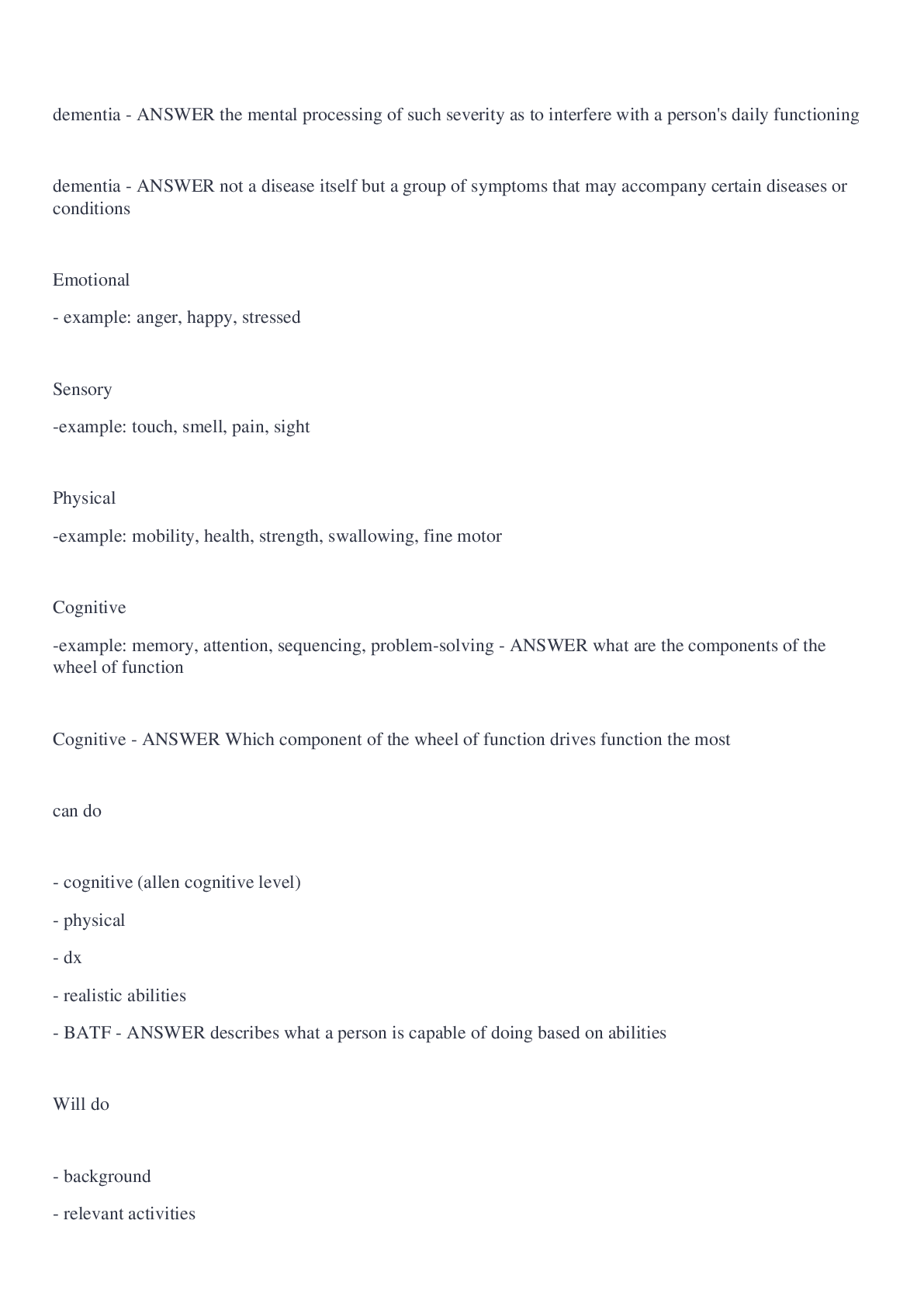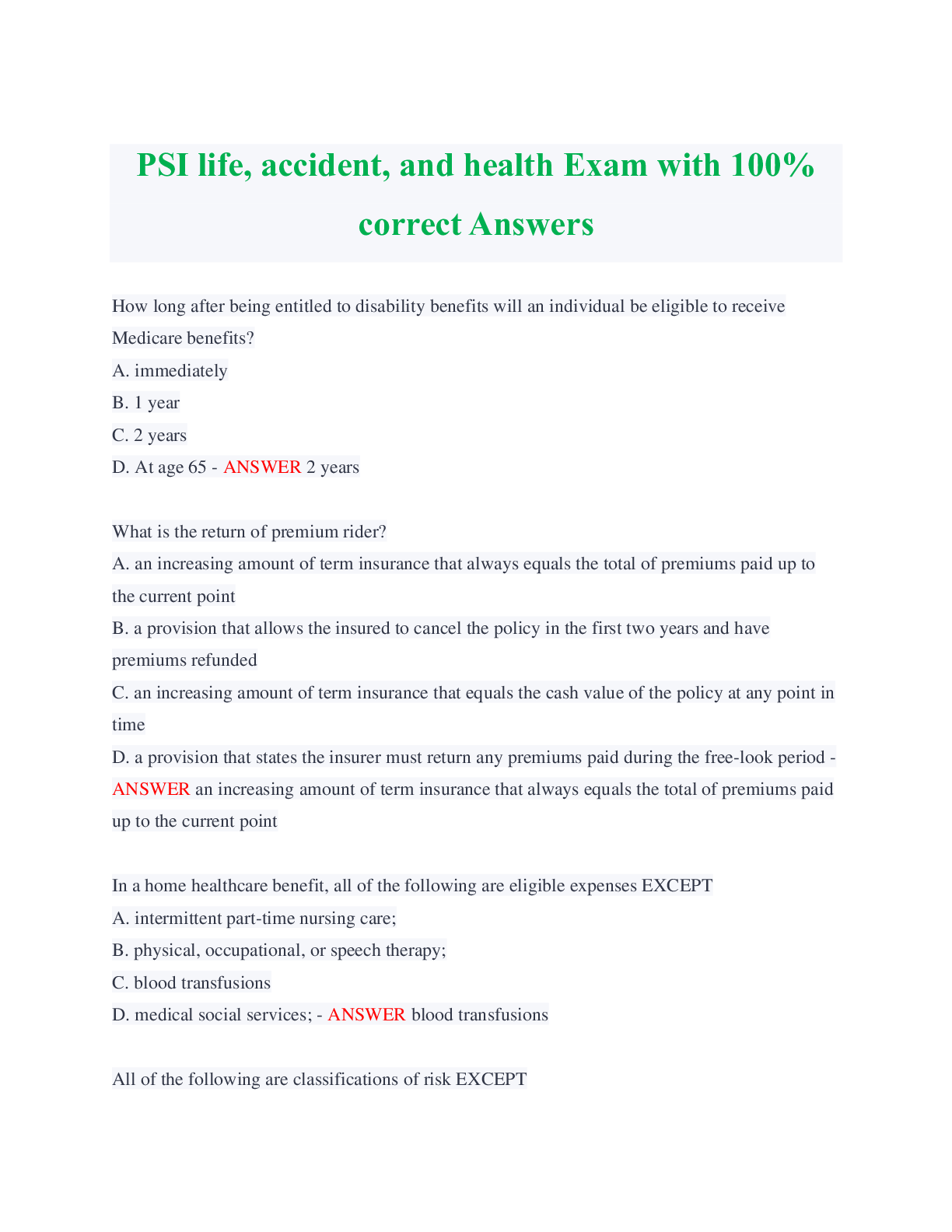*NURSING > EXAM > dementia care specialist certification exam latest 2022( with complete solutions) (All)
dementia care specialist certification exam latest 2022( with complete solutions)
Document Content and Description Below
dementia - ANSWER the mental processing of such severity as to interfere with a person's daily functioning dementia - ANSWER not a disease itself but a group of symptoms that may accompany certain ... diseases or conditions Emotional - example: anger, happy, stressed Sensory -example: touch, smell, pain, sight Physical -example: mobility, health, strength, swallowing, fine motor Cognitive -example: memory, attention, sequencing, problem-solving - ANSWER what are the components of the wheel of function Cognitive - ANSWER Which component of the wheel of function drives function the most can do - cognitive (allen cognitive level) - physical - dx - realistic abilities - BATF - ANSWER describes what a person is capable of doing based on abilities Will do - background - relevant activities - personally influenced - influenced by interests & values - culture - ANSWER describes what a person could do if interested or motivated May do - financial - geographical - environmental - possible abilities - externally influenced - impacted by caregivers, family, & environment - what we can draw out of the person - ANSWER describes what a person might be able to do w/ sufficient support short term memory - seconds - minutes - days tx: - avoid quiz life questions - be able to rephrase questions to yes/no or closed ended - ANSWER holding of info for a short period of time short term memory and working memory - ANSWER WEAK form of memory long term memory and procedural memory - ANSWER STRONG form of memory Long term memory - weeks - months - years Tx: - photos, sounds, smells, reminiscence groups, stories of their mother - ANSWER memories that can last or are held from days to years procedural memory tx: - tactile or cognitive cues - be careful not to contribute to unnecessary disability (doing components of a task that they are capable of doing) - establish their own routines - ANSWER long-term memory of skills and procedures working memory tx: - repetition - demonstrations - signs - breaking the task down - ANSWER short-term holding and manipulation of new info short term memory - ANSWER loss of this type of memory causes individuals not remembering what you were going to get or recent events long term memory - ANSWER loss of this type of memory causes individuals to get lost, sad, frustrated, a lot of emotional distress procedural memory - ANSWER loss of this type of memory causes individuals to need a lot of help, perceived disability working memory - ANSWER loss of this type of memory causes individuals to have difficulty w/ new learning Level 1: Automatic Actions Level 2: Postural Actions Level 3: Manual Actions Level 4: Goal- Directed Activity Level 5: Independent Learning Activities Level 6: Planned Activities - ANSWER List the Allen Cognitive Levels Dementia Severity: End Stage ACL: 1 (automatic actions) Developmental Age: infant (0-12 months) Level of Assistance Needed for BATF: constant verbal, visual, and tactile cues (86-100% cognitive assist) MDS Level: Total dependence - ANSWER Dementia Severity: End Stage ACL: Developmental Age: Level of Assistance Needed for BATF: MDS Level: - wait for a response - Provide meaningful sensory promote vocalization, mov't, and interaction - Provide stimuli directly in front of the person to capture attention - Gain the person's trust and agreement - ANSWER Care approach for end stage dementia Dementia Severity: Late Stage ACL: 2 (postural actions) Developmental Age: 12 - 18 months Level of Assistance Needed for BATF: constant verbal, visual, and tactile cues (71-85% cognitive assist) MDS Level: extensive assist - ANSWER Dementia Severity: Late Stage ACL: Developmental Age: Level of Assistance Needed for BATF: MDS Level: - wait for a response (10-20 seconds) - Provide stimuli directly in front of the person to capture attention - use verbal, visual, and tactile cue to gain attention and to help process directions - Gain the person's trust and agreement - ANSWER Care approach for late stage dementia Dementia Severity: Middle Stage ACL: 3 (manual actions) Developmental Age: 18 mos- 3 years Level of Assistance Needed for BATF: constant to intermittent verbal cues and intermittent visual and/or tactile cues (46 - 70% cognitive assist) MDS Level: limit assist - ANSWER Dementia Severity: Middle Stage ACL: Developmental Age: Level of Assistance Needed for BATF: MDS Level: - verbal, visual, and tactile cues [Show More]
Last updated: 2 years ago
Preview 1 out of 9 pages

Buy this document to get the full access instantly
Instant Download Access after purchase
Buy NowInstant download
We Accept:

Reviews( 0 )
$7.00
Can't find what you want? Try our AI powered Search
Document information
Connected school, study & course
About the document
Uploaded On
Jul 28, 2022
Number of pages
9
Written in
Additional information
This document has been written for:
Uploaded
Jul 28, 2022
Downloads
0
Views
73


















